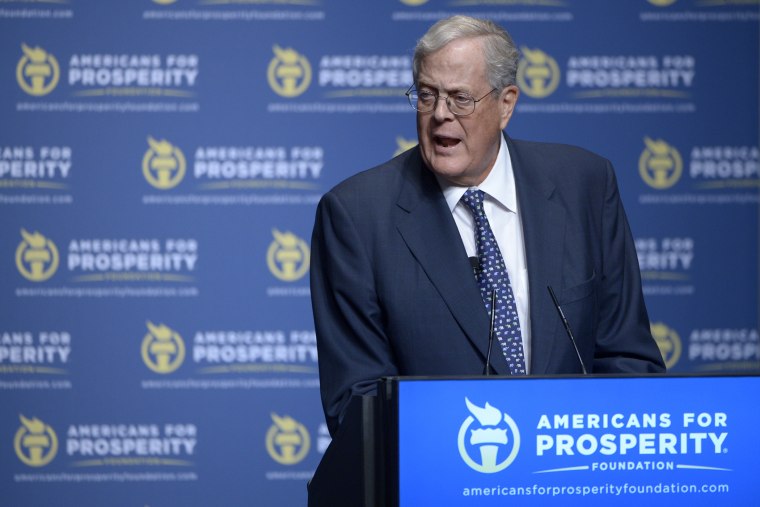When it comes to campaign fundraising, it's easy for the numbers to start to blur together. One candidate raised several million dollars, but is struggling with cash on hand. Another had a subpar monthly report, but fared well in the quarterly report. There are PACs, super PACs, campaign committees, state parties, and on and on, each furiously trying to fill their coffers -- and in a "permanent campaign" environment, it seems to never stop.
I mention this because I understand how easy it is to start tuning out reports on the role of money in elections. Everyone gets it: there's a lot of money being raised and spent.
But some reports shouldn't be dismissed too quickly.
This piece from Matea Gold, for example, was legitimately jaw-dropping.
A network of conservative advocacy groups backed by Charles and David Koch aims to spend a staggering $889 million in advance of the next White House election, part of an expansive strategy to build on its 2014 victories that may involve jumping into the Republican primaries. The massive financial goal was revealed to donors here Monday during an annual winter meeting hosted by Freedom Partners, the tax-exempt business lobby that serves as the hub of the Koch-backed political operation, according to an attendee. The amount is more than double the $407 million that 17 allied groups in the network raised during the 2012 campaign.
The question is not whether $889 million is a lot of money to invest in a single election. It is. Rather, the key here is understanding what such a sum represents in a democratic system of government.
Alex Seitz-Wald, noting how "astonishing" the figure is, provided some
helpful context:
If they turned on the money spigots today, it would mean spending about $1.36 million a day, every day, from now until November 8, 2016. That's $56,899 per hour, and $948 per second. [...] It dwarfs the $404 million spent by the Republican National Committee during the 2012 presidential election, which was the most expensive election on record, and more than either Barack Obama or Mitt Romney raised for their campaigns.
Indeed, in 2012, the Republican National Committee, the National Republican Congressional Committee, and the National Republican Senatorial Committee spent a combined total
of $657 million. The Kochs' network intend to pass that total quite easily.
The primacy of political parties and presidential campaigns themselves will be challenged next year. For all intents and purposes, the Koch brothers and their partners will oversee an operation that is, in effect, a political party.
Or put another way, when some of you receive hair-on-fire fundraising appeals from Democrats and progressive groups, writing in all caps about powerful and wealthy conservatives investing unprecedented sums in support of their Republican allies, for a change, those appeals probably won't be hyperbolic.
Brad Woodhouse, president of the progressive American Bridge,
added in a statement, "The Kochs are planning to spend an outrageous amount of money on the 2016 election, more than the RNC did in 2012, and nearly $1 billion in total, because they'll stop at nothing to purchase a government that grows their profits, weakens pollution standards, and maintains tax breaks for big oil- all at the expense of investing in middle class families and an economy that works for everyone."
It's worth emphasizing that while Charles and David Koch seem likely to contribute generously to their cause, the $889 million figure does not mean the controversial conservative billionaires will simply write a check for $889 million. Rather, that's the estimated total of what the Kochs and their allies would spend collectively as part of their network operation.
